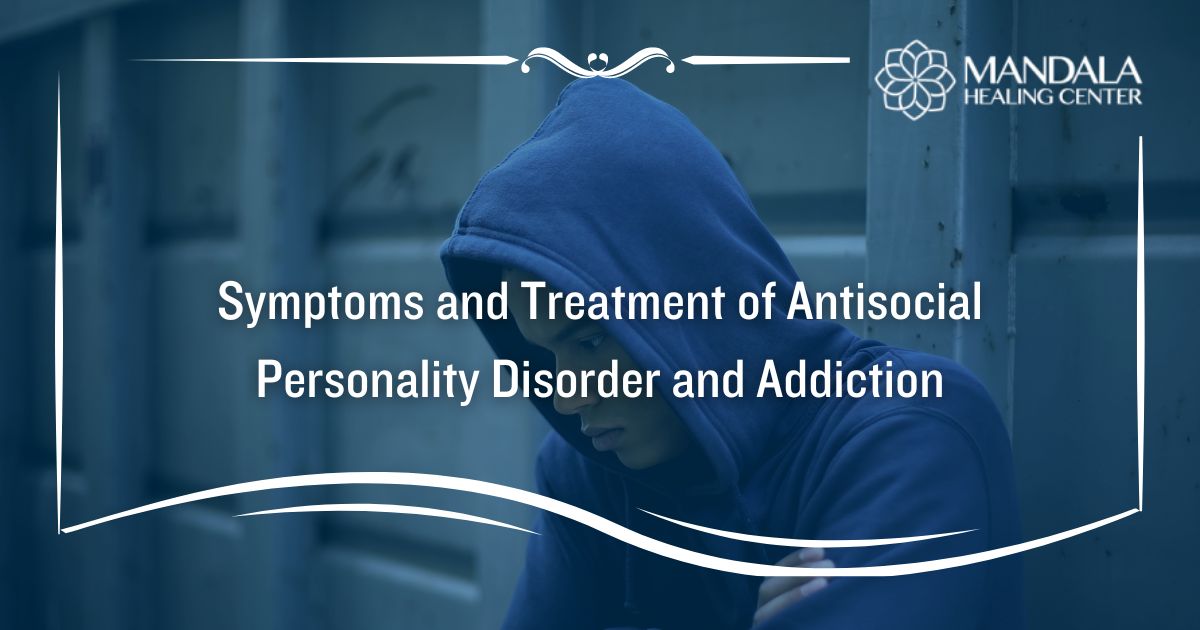Millions of people in the United States live with mental health conditions. An untreated mental illness can affect every part of a person’s life. It may affect their health, relationships, and ability to function.
Antisocial personality disorder (ASPD) is a type of mental health disorder. ASPD and other personality disorders cause damaging patterns of thinking and behavior. People with a personality disorder may not be able to identify problematic thoughts and behaviors.
People with antisocial personality disorder may be at greater risk for substance abuse and addiction. This article will explore the symptoms of antisocial personality disorder. You will also learn about treating antisocial personality disorder and addiction.
Reach out to the Mandala Healing Center specialists to learn about your drug and alcohol abuse treatment options. You may also ask questions or schedule an intake assessment.
What is Antisocial Personality Disorder?
A personality disorder is a mental health condition. Personality disorders involve long-term harmful mood patterns. People with a personality disorder may struggle with relationships. They often feel distressed or can’t function well.
There are ten specific personality disorders. Each personality disorder has its own symptoms.
According to the Diagnostic and Statistical Manual of Mental Disorders (DSM), symptoms of antisocial personality disorder include:
- Lack of empathy toward others
- Impulsive behaviors
- Antisocial behaviors
- Ignoring or resisting social norms
- Seeing others as a means to an end–meaning using other people to get what they want
- Aggression
- Repeatedly breaking the law
- Chronic thoughtless or reckless behavior
- Ignoring responsibilities
- Lack of remorse for their actions
The DSM classifies antisocial personality disorder as a Cluster B disorder. Cluster B personality disorders involve intense and unstable emotions. People with Cluster B disorders often have impulsive behaviors.
Children who have these behaviors may receive a diagnosis of conduct disorder. They may get a diagnosis of antisocial personality disorder in adulthood.
The Connection Between Personality Disorders and Addiction
People with personality disorders can struggle with impulsive behaviors. They may also have difficulty regulating their emotions or getting along with others. These factors can increase their risk of developing an addiction to alcohol or drugs.
People with ASPD often do risky or impulsive things. They may use drugs and alcohol without considering the results. People with antisocial personality disorder often act without thinking about how their behaviors will harm other people. They may break the law without feeling guilty.
Regular or heavy substance abuse can lead to physical dependence and addiction. People who use drugs or alcohol a lot may develop tolerance.
Tolerance happens when a person’s body adjusts to the presence of a substance. Over time, people with tolerance may need to use larger and larger amounts of a substance to get the effects they want.
People with ASPD and other personality disorders often do not recognize the effect of their behaviors. They may develop an addiction without realizing the severity of their problem.
People with antisocial personality disorder and addiction need treatment for both conditions. They require comprehensive substance abuse rehab programs that provide mental health treatment.
Treatment for ASPD and Substance Use Disorder
People with personality disorders and addiction need specialized treatment. Comprehensive treatment programs can help people manage the symptoms of their personality disorder and overcome addiction.
Getting treatment for ASPD and addiction can help people function better, improve their relationships, and feel more comfortable.
A treatment plan for antisocial personality disorder and addiction may include:
- Individual counseling
- Group therapy
- Family therapy
- Relapse prevention education
- Mental health treatment
- Medical care
- Medications
- Nutrition support, mindfulness, exercise, and other holistic therapies
- Aftercare planning
Talk therapy is one of the most critical parts of a treatment program for ASPD and addiction. Cognitive behavioral therapy (CBT) and dialectical behavioral therapy (DBT) are two types of talk therapy. They are the most common types of talk therapy practitioners use to treat personality disorders.
The goals of talk therapy include:
- Managing symptoms of depression
- Reducing stress
- Recognizing and accepting personal responsibility for destructive thoughts and actions
- Identifying and changing personality traits that cause relationship problems
- Improving functioning
- Reducing stress
- Reducing destructive behavior
- Improving healthy behaviors
People with a personality disorder often cannot recognize that their thoughts, actions, and behaviors are causing problems. Talk therapy can help people look differently at their behaviors and make important changes.
It is important to treat ASPD and addiction at the same time. People who live with both conditions require compassionate treatment to manage both conditions. They must also have good aftercare options. Following an aftercare plan might include:
- Attending 12-step meetings
- Support groups
- Individual counseling
- Sober living
- Regular medical and mental health treatment
People with ASPD and addiction can live healthier, happier lives if they get the treatment and support they need.
Find Help Now
If you or someone in your life lives with antisocial personality disorder and addiction, you are not alone. Contact the Mandala Healing Center specialists to learn about our holistic rehab programs. You may also schedule an intake assessment.












